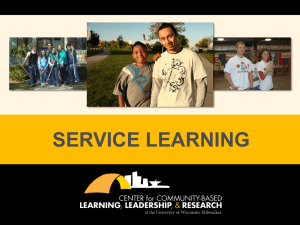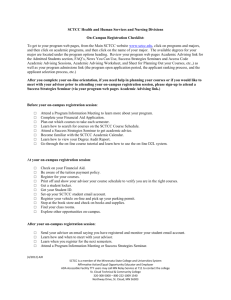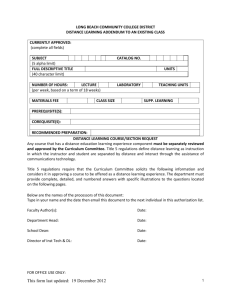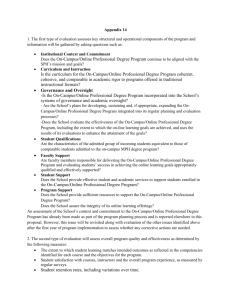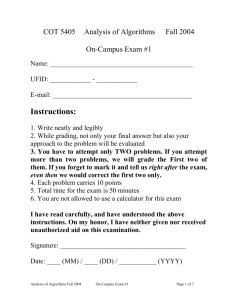Link to Paper - University of Wisconsin
advertisement
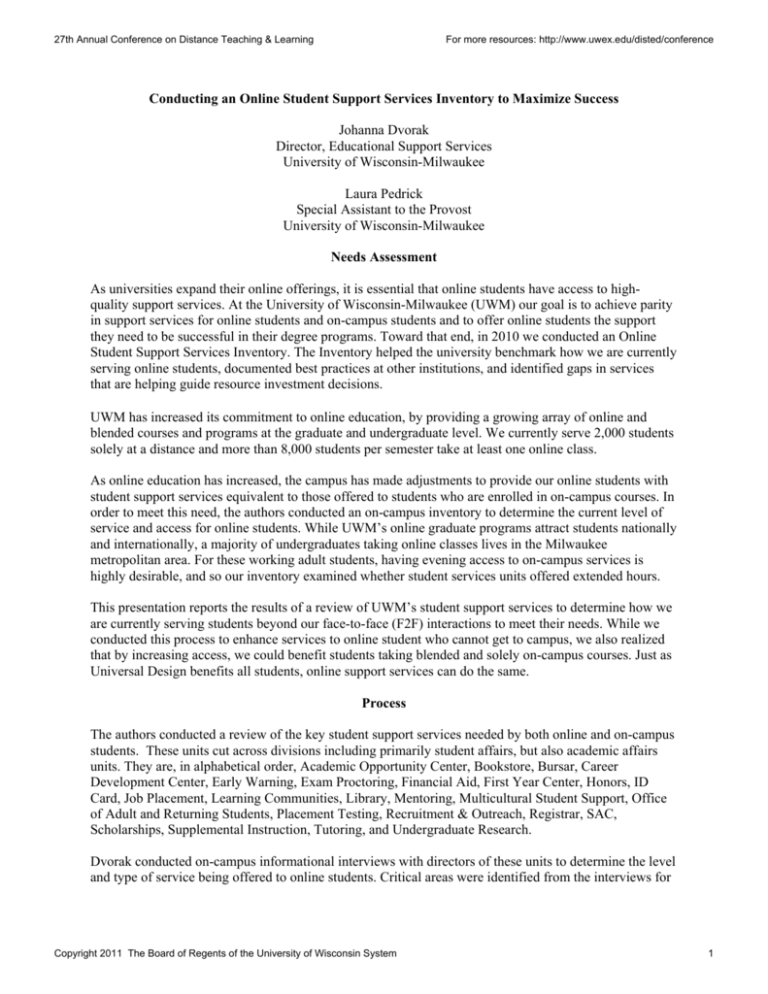
27th Annual Conference on Distance Teaching & Learning For more resources: http://www.uwex.edu/disted/conference Conducting an Online Student Support Services Inventory to Maximize Success Johanna Dvorak Director, Educational Support Services University of Wisconsin-Milwaukee Laura Pedrick Special Assistant to the Provost University of Wisconsin-Milwaukee Needs Assessment As universities expand their online offerings, it is essential that online students have access to highquality support services. At the University of Wisconsin-Milwaukee (UWM) our goal is to achieve parity in support services for online students and on-campus students and to offer online students the support they need to be successful in their degree programs. Toward that end, in 2010 we conducted an Online Student Support Services Inventory. The Inventory helped the university benchmark how we are currently serving online students, documented best practices at other institutions, and identified gaps in services that are helping guide resource investment decisions. UWM has increased its commitment to online education, by providing a growing array of online and blended courses and programs at the graduate and undergraduate level. We currently serve 2,000 students solely at a distance and more than 8,000 students per semester take at least one online class. As online education has increased, the campus has made adjustments to provide our online students with student support services equivalent to those offered to students who are enrolled in on-campus courses. In order to meet this need, the authors conducted an on-campus inventory to determine the current level of service and access for online students. While UWM’s online graduate programs attract students nationally and internationally, a majority of undergraduates taking online classes lives in the Milwaukee metropolitan area. For these working adult students, having evening access to on-campus services is highly desirable, and so our inventory examined whether student services units offered extended hours. This presentation reports the results of a review of UWM’s student support services to determine how we are currently serving students beyond our face-to-face (F2F) interactions to meet their needs. While we conducted this process to enhance services to online student who cannot get to campus, we also realized that by increasing access, we could benefit students taking blended and solely on-campus courses. Just as Universal Design benefits all students, online support services can do the same. Process The authors conducted a review of the key student support services needed by both online and on-campus students. These units cut across divisions including primarily student affairs, but also academic affairs units. They are, in alphabetical order, Academic Opportunity Center, Bookstore, Bursar, Career Development Center, Early Warning, Exam Proctoring, Financial Aid, First Year Center, Honors, ID Card, Job Placement, Learning Communities, Library, Mentoring, Multicultural Student Support, Office of Adult and Returning Students, Placement Testing, Recruitment & Outreach, Registrar, SAC, Scholarships, Supplemental Instruction, Tutoring, and Undergraduate Research. Dvorak conducted on-campus informational interviews with directors of these units to determine the level and type of service being offered to online students. Critical areas were identified from the interviews for Copyright 2011 The Board of Regents of the University of Wisconsin System 1 27th Annual Conference on Distance Teaching & Learning For more resources: http://www.uwex.edu/disted/conference further implementation of online services. A chart was developed that delineated by department web services, online synchronous communication, and the availability and times of extended evening hours. Simultaneously, the authors researched best practices from other campuses and programs to determine what level of service our campus should attain for online students. Interview Summary The interviews revealed that there were varying degrees of interest, commitment, access, and services for online students. For some, the act of interviewing sparked interest in to look at services and begin to make changes in their services. Analysis of results showed that there were three categories of services: (a) Some services and programs focused primarily or solely on serving on-campus students; (b) Some had made some effort to serve online students; and (c) Some had made significant efforts to reach students at a distance. On-Campus Focus In the first group, directors of on-campus programs such as Honors, Academic Opportunity Center, and the Office of Undergraduate Research (OUR), and the Office for International Education saw themselves primarily as serving on-campus students. The Honors program is adding a residence hall living learning community, to bring top students together in smaller classes. Undergraduate researchers get to know a faculty member and work with him or her on research topics in their field of interest. However, some ideas began to be generated to offer online students opportunities, such as conducting research online. All offices were interested in developing new ways to reach their students online. In keeping with our urban mission, the Academic Opportunity Center admits students who do not meet all admission criteria to the university, but who are screened and admitted for their capability for college success. Advisors saw these students to be at a disadvantage because they did not usually have computers or the preparation for online learning. Their advisors would not recommend that their students begin their college experience with an online course. They were concerned about the potential for failure of their students in online courses. Many of these students begin coursework at the developmental level in math, English composition, and college study strategies. Some Online Focus Others are further along the path and are looking to build on their level of support to enhance services further. The second group had developed unit Websites with information about services, online FAQ’s, and they were in contact with their students via phone, email, and in some cases, Skype. These units did not have consistent evening hours when someone from their office would be available virtually for online students. However, directors in this group had begun to realize that practices were not always meeting students’ needs and were focusing attention on this area. For example, the First Year Center is now using mentors to contact incoming students via email before the school year starts. They are interested in using social media and Web conferencing as ways to reach out to incoming students, including those who will be strictly online. Having virtual clubs and including online students virtually in on-campus lectures or events could connect online student to campus. Throughout this group of “early majority” adopters, including Financial Aid, the Student Accessibility Center, and the Bursar’s Office, there was interest in using synchronous tools such as Skype and Elluminate to allow staff to communicate with students while viewing documents and expand online student access to services. Units were also developing more self-service features on their Websites, building on a successful implementation of IntelliResponse in Financial Aid. Copyright 2011 The Board of Regents of the University of Wisconsin System 2 27th Annual Conference on Distance Teaching & Learning For more resources: http://www.uwex.edu/disted/conference Significant Online Focus The third group has developed its services to meet the needs of online students as well as on-campus students. This group is represented by the Golda Meir Library, the Career Development Center, the University Bookstore, and Panther Academic Support Services and the Writing Center. These units have developed podcasts for student use, online courses for students who need support in their areas, and Web conferencing tools. The UWM Bookstore is also meeting the needs of online students. The Golda Meir Library has many Distance Education (DE) services. DE registered students are eligible to have materials delivered to them at no charge. Faculty and academic staff may place course materials on E-Reserve, which is available 24/7 for unlimited simultaneous off-campus student users. Students may use chat, text, IM, email, and a toll-free number to contact librarians. They may also arrange for virtual research consultations. The Career Development Center has a virtual career center Website which can easily be accessed by online students as well as on-campus students. Some of the features include: podcasts/Webcasts on career topics, online workshops, FAQs, downloadable print resources, and PantherJobs, an online job search database. The University Bookstore puts all books for sale by course on its Website, making its service accessible 24/7. Currently, new texts, used texts, rentals, and e-texts, as well as supplementary materials are available online. Currently 1/9th of book sales occur via the Web. Of that portion, 70% is in textbook sales. The Bookstore markets to students off-campus through the Website, mail, TV commercials, Facebook, and Twitter. Panther Academic Support Services (PASS) has conducted online review sessions for first- and secondyear large lecture courses through its Tutoring and Supplemental Instruction programs. Most popular are exam reviews using Elluminate Web conferencing technology. Podcasts of key concepts are being captured from the sessions and placed in the content section of the PASS site of course information platform, D2L, for students to review. UWM’s Writing Center offers online tutoring, reviewing student papers online, and the Center has recently introduced live chat and audio options for synchronous meetings with students. Sharing Strategies for Online Student Support Participants were reflective about their efforts to serve online students, and were willing to develop additional strategies to serve them better. For some, this was the beginning of online student support. However, the interview experience generated interest and ideas that could be implemented this year and beyond. Others are further along the path and are willing to share their expertise with other student service departments. So far, these areas for student support have been identified from initial interviews: Human resources need to be addressed: extending hours, adding staff, providing online training, etc. The campus Website needs to be developed to its fullest potential, including Web page accessibility, to improve information and access for online (and all) students. Other technologies should be utilized to reach online students synchronously and asynchronously: podcasting, Web conferencing, etc. Interviewing, advising or tutoring through Skype or another Web conferencing system such as Elluminate could be more widely implemented. Copyright 2011 The Board of Regents of the University of Wisconsin System 3 27th Annual Conference on Distance Teaching & Learning For more resources: http://www.uwex.edu/disted/conference Beginning in 2010-2011, UWM engaged in a technology-focused strategic planning process to move UWM into the Digital Future. Working groups focused on bringing research, teaching and learning, and student services into the 24/7 digital era met throughout the year. These discussions have generated interest, new ideas, and enthusiasm for online learning. The results of the inventory of online services are informing Digital Future planning, and from this initial benchmark of online services, we are making plans to build a cohesive array of support services for online students that will also benefit our on-campus student population. About the Presenters Johanna Dvorak directs a comprehensive educational support program at the University of WisconsinMilwaukee (UWM). Panther Academic Support Services (PASS) includes peer tutoring, Supplemental Instruction, and online academic support services. She is a past president of the National College Learning Center Association (NCLCA). A qualitative researcher, her research interests include learning assistance management, tutoring programs and resources, and online support services. Johanna earned her PhD in Educational Leadership and Information Studies from UWM, her M.Ed. at University of Texas at Austin in Curriculum & Instruction and Library Science, and her B.A. in English at Drake University. Address: jdvorak@uwm.edu Laura Pedrick is the Special Assistant to the Provost at the University of Wisconsin- Milwaukee, where she oversees the University’s online and blended programs. She serves as co-chair of the University’s Online Program Council, directs the seed funding program for new online programs, and is project manager a Bill & Melinda Gates Foundation Next Generation Learning Challenge grant on the innovative U-Pace instructional model. Laura is a co-author of Policy Practice for Social Workers: New Strategies for a New Era and Social Work Skills Demonstrated, which features a textbook, workbook and interactive web-based case studies, both published by Pearson/Allyn & Bacon. Her background is in mass communication, and she holds a master’s degree in journalism from the University of Minnesota. Address: lpedrick@uwm.edu Copyright 2011 The Board of Regents of the University of Wisconsin System 4
